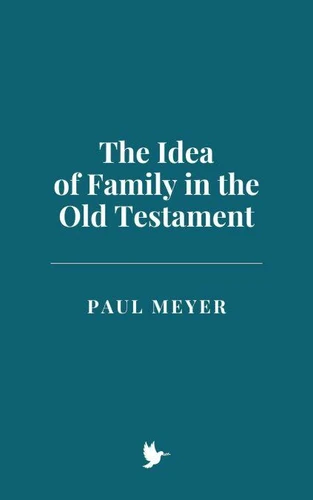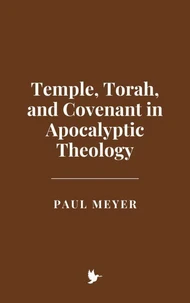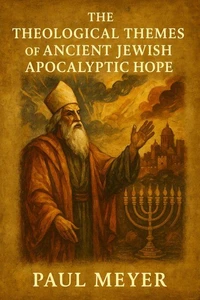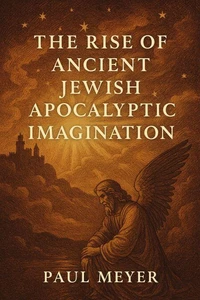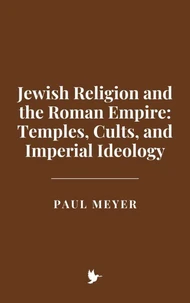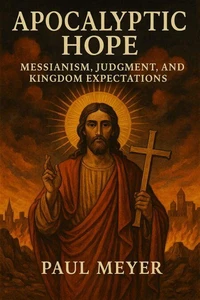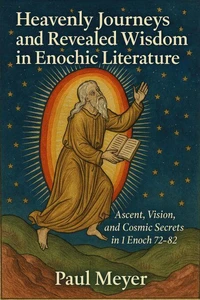The Idea of Family in the Old Testament
Par :Formats :
Disponible dans votre compte client Decitre ou Furet du Nord dès validation de votre commande. Le format ePub est :
- Compatible avec une lecture sur My Vivlio (smartphone, tablette, ordinateur)
- Compatible avec une lecture sur liseuses Vivlio
- Pour les liseuses autres que Vivlio, vous devez utiliser le logiciel Adobe Digital Edition. Non compatible avec la lecture sur les liseuses Kindle, Remarkable et Sony
 , qui est-ce ?
, qui est-ce ?Notre partenaire de plateforme de lecture numérique où vous retrouverez l'ensemble de vos ebooks gratuitement
Pour en savoir plus sur nos ebooks, consultez notre aide en ligne ici
- FormatePub
- ISBN8230047353
- EAN9798230047353
- Date de parution02/02/2025
- Protection num.pas de protection
- Infos supplémentairesepub
- ÉditeurIndependently Published
Résumé
This book explores the concept of family in the Old Testament, tracing its evolution, role, and significance from the earliest biblical narratives through to the post-exilic period. The family, as portrayed in the Hebrew Bible, is not merely a social unit but the bedrock of spiritual, ethical, and national identity for the people of Israel. The book examines the foundational familial structures in the Abrahamic covenant, the complexities of sibling rivalry, parental authority, and the inheritance of God's promises through generations.
It delves into the laws of Moses, which governed family life, marriage, and the transmission of spiritual and moral values, and discusses the impact of exile on family structures, where families became the central means of preserving religious identity and continuity during times of national crisis. Throughout the chapters, key figures such as Abraham, Jacob, Joseph, Moses, David, and Solomon, along with the teachings in the wisdom literature, illustrate how the family acted as both a moral compass and a community force in shaping Israel's relationship with God.
The exploration of family is enriched by the prophetic literature, where familial metaphors often symbolize Israel's covenantal relationship with God, highlighting themes of faithfulness, betrayal, repentance, and restoration. Additionally, the text emphasizes the collective responsibility of families to uphold divine laws, teaching their children the ways of God, and ensuring the survival and spiritual health of the nation.
The book concludes by examining the post-exilic period, where the rebuilding of Israel was inseparable from the reinstitution of family structures, the passing down of traditions, and the establishment of religious practices that would maintain Israel's identity. Ultimately, this work presents the family as the central institution in Israelite society, shaping both the individual and the community's covenantal life, and as a vital means through which God's promises were fulfilled.
The study provides a holistic view of the family in the Old Testament as both a microcosm of the larger divine narrative and an enduring symbol of Israel's spiritual journey.
It delves into the laws of Moses, which governed family life, marriage, and the transmission of spiritual and moral values, and discusses the impact of exile on family structures, where families became the central means of preserving religious identity and continuity during times of national crisis. Throughout the chapters, key figures such as Abraham, Jacob, Joseph, Moses, David, and Solomon, along with the teachings in the wisdom literature, illustrate how the family acted as both a moral compass and a community force in shaping Israel's relationship with God.
The exploration of family is enriched by the prophetic literature, where familial metaphors often symbolize Israel's covenantal relationship with God, highlighting themes of faithfulness, betrayal, repentance, and restoration. Additionally, the text emphasizes the collective responsibility of families to uphold divine laws, teaching their children the ways of God, and ensuring the survival and spiritual health of the nation.
The book concludes by examining the post-exilic period, where the rebuilding of Israel was inseparable from the reinstitution of family structures, the passing down of traditions, and the establishment of religious practices that would maintain Israel's identity. Ultimately, this work presents the family as the central institution in Israelite society, shaping both the individual and the community's covenantal life, and as a vital means through which God's promises were fulfilled.
The study provides a holistic view of the family in the Old Testament as both a microcosm of the larger divine narrative and an enduring symbol of Israel's spiritual journey.
This book explores the concept of family in the Old Testament, tracing its evolution, role, and significance from the earliest biblical narratives through to the post-exilic period. The family, as portrayed in the Hebrew Bible, is not merely a social unit but the bedrock of spiritual, ethical, and national identity for the people of Israel. The book examines the foundational familial structures in the Abrahamic covenant, the complexities of sibling rivalry, parental authority, and the inheritance of God's promises through generations.
It delves into the laws of Moses, which governed family life, marriage, and the transmission of spiritual and moral values, and discusses the impact of exile on family structures, where families became the central means of preserving religious identity and continuity during times of national crisis. Throughout the chapters, key figures such as Abraham, Jacob, Joseph, Moses, David, and Solomon, along with the teachings in the wisdom literature, illustrate how the family acted as both a moral compass and a community force in shaping Israel's relationship with God.
The exploration of family is enriched by the prophetic literature, where familial metaphors often symbolize Israel's covenantal relationship with God, highlighting themes of faithfulness, betrayal, repentance, and restoration. Additionally, the text emphasizes the collective responsibility of families to uphold divine laws, teaching their children the ways of God, and ensuring the survival and spiritual health of the nation.
The book concludes by examining the post-exilic period, where the rebuilding of Israel was inseparable from the reinstitution of family structures, the passing down of traditions, and the establishment of religious practices that would maintain Israel's identity. Ultimately, this work presents the family as the central institution in Israelite society, shaping both the individual and the community's covenantal life, and as a vital means through which God's promises were fulfilled.
The study provides a holistic view of the family in the Old Testament as both a microcosm of the larger divine narrative and an enduring symbol of Israel's spiritual journey.
It delves into the laws of Moses, which governed family life, marriage, and the transmission of spiritual and moral values, and discusses the impact of exile on family structures, where families became the central means of preserving religious identity and continuity during times of national crisis. Throughout the chapters, key figures such as Abraham, Jacob, Joseph, Moses, David, and Solomon, along with the teachings in the wisdom literature, illustrate how the family acted as both a moral compass and a community force in shaping Israel's relationship with God.
The exploration of family is enriched by the prophetic literature, where familial metaphors often symbolize Israel's covenantal relationship with God, highlighting themes of faithfulness, betrayal, repentance, and restoration. Additionally, the text emphasizes the collective responsibility of families to uphold divine laws, teaching their children the ways of God, and ensuring the survival and spiritual health of the nation.
The book concludes by examining the post-exilic period, where the rebuilding of Israel was inseparable from the reinstitution of family structures, the passing down of traditions, and the establishment of religious practices that would maintain Israel's identity. Ultimately, this work presents the family as the central institution in Israelite society, shaping both the individual and the community's covenantal life, and as a vital means through which God's promises were fulfilled.
The study provides a holistic view of the family in the Old Testament as both a microcosm of the larger divine narrative and an enduring symbol of Israel's spiritual journey.

